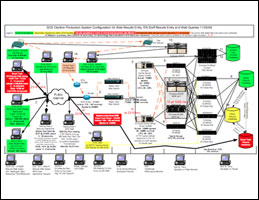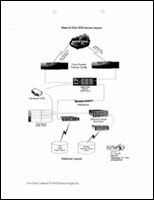by Bob Fitrakis
July 19, 2011
A new filing in the King Lincoln Bronzeville v. Blackwell case includes a copy of the Ohio Secretary of State election production system configuration that was in use in Ohio’s 2004 presidential election when there was a sudden and unexpected shift in votes for George W. Bush.
The filing also includes the revealing deposition of the late Michael Connell. Connell served as the IT guru for the Bush family and Karl Rove. Connell ran the private IT firm GovTech that created the controversial system that transferred Ohio’s vote count late on election night 2004 to a partisan Republican server site in Chattanooga, Tennessee owned by SmarTech. That is when the vote shift happened, not predicted by the exit polls, that led to Bush’s unexpected victory. Connell died a month and a half after giving this deposition in a suspicious small plane crash.
Additionally, the filing contains the contract signed between then-Ohio Secretary of State J. Kenneth Blackwell and Connell’s company, GovTech Solutions. Also included that contract a graphic architectural map of the Secretary of State’s election night server layout system.


Prior to the filing, Cliff Arnebeck, lead attorney in the King Lincoln case, exchanged emails with IT security expert Stephen Spoonamore. Arnebeck asked Spoonamore whether or not SmarTech had the capability to “input data” and thus alter the results of Ohio’s 2004 election. Spoonamore responded: “Yes. They would have had data input capacities. The system might have been set up to log which source generated the data but probably did not.”
Spoonamore explained that “they [SmarTech] have full access and could change things when and if they want.”
Arnebeck specifically asked “Could this be done using whatever bypass techniques Connell developed for the web hosting function.” Spoonamore replied “Yes.”
Spoonamore concluded from the architectural maps of the Ohio 2004 election reporting system that, “SmarTech was a man in the middle. In my opinion they were not designed as a mirror, they were designed specifically to be a man in the middle.”
A “man in the middle” is a deliberate computer hacking setup, which allows a third party to sit in between computer transmissions and illegally alter the data. A mirror site, by contrast, is designed as a backup site in case the main computer configuration fails.
Spoonamore claims that he confronted then-Secretary of State Blackwell at a secretary of state IT conference in Boston where he was giving a seminar in data security. “Blackwell freaked and refused to speak to me when I confronted him about it long before I met you,” he wrote to Arnebeck.
Read the email correspondence here [pdf]
On December 14, 2007, then-Secretary of State Jennifer Brunner, who replaced Blackwell, released her evaluation and validation of election-related equipment, standards and testing (Everest study) which found that touchscreen voting machines were vulnerable to hacking with relative ease.
Until now, the architectural maps and contracts from the Ohio 2004 election were never made public, which may indicate that the entire system was designed for fraud. In a previous sworn affidavit to the court, Spoonamore declared: “The SmarTech system was set up precisely as a King Pin computer used in criminal acts against banking or credit card processes and had the needed level of access to both county tabulators and Secretary of State computers to allow whoever was running SmarTech computers to decide the output of the county tabulators under its control.”
Spoonamore also swore that “…the architecture further confirms how this election was stolen. The computer system and SmarTech had the correct placement, connectivity, and computer experts necessary to change the election in any manner desired by the controllers of the SmarTech computers.”
Project Censored named the outsourcing of Ohio’s 2004 election votes to SmarTech in Chattanooga, Tennessee to a company owned by Republican partisans as one of the most censored stories in the world.
In the Connell deposition, plaintiffs’ attorneys questioned Connell regarding gwb43, a website that was live on election night operating out of the White House and tied directly into SmarTech’s server stacks in Chattanooga, Tennessee which contained Ohio’s 2004 presidential election results.
The transfer of the vote count to SmarTech in Chattanooga, Tennessee remains a mystery. This would have only happened if there was a complete failure of the Ohio computer election system. Connell swore under oath that, “To the best of my knowledge, it was not a fail-over case scenario – or it was not a failover situation.”
Bob Magnan, a state IT specialist for the secretary of state during the 2004 election, agreed that there was no failover scenario. Magnan said he was unexpectedly sent home at 9 p.m. on election night and private contractors ran the system for Blackwell.
The architectural maps, contracts, and Spoonamore emails, along with the history of Connell’s partisan activities, shed new light on how easy it was to hack the 2004 Ohio presidential election.
Download the Plaintiffs’ Brief here [zip]
—
Bob Fitrakis is co-counsel in the King Lincoln case.


